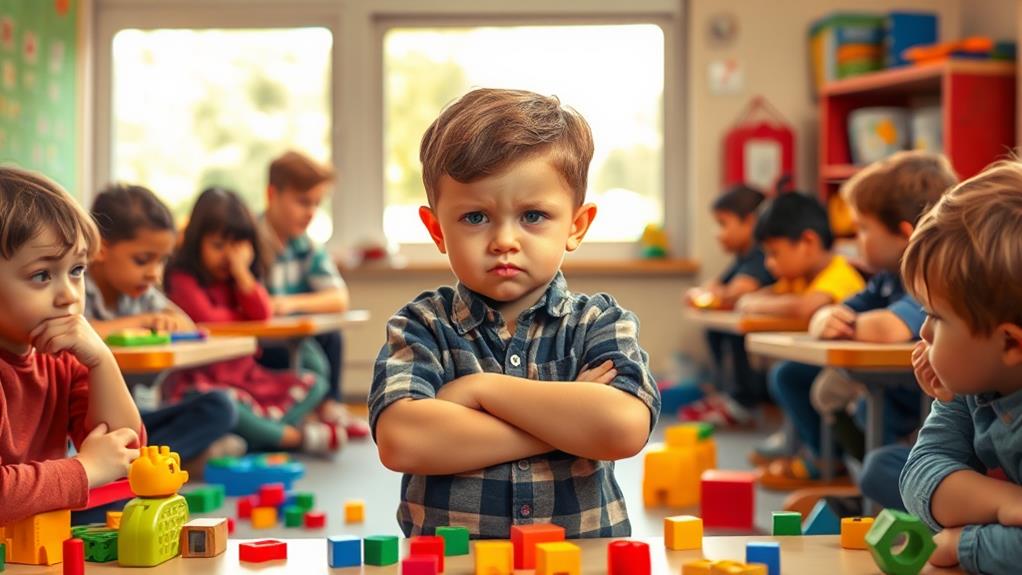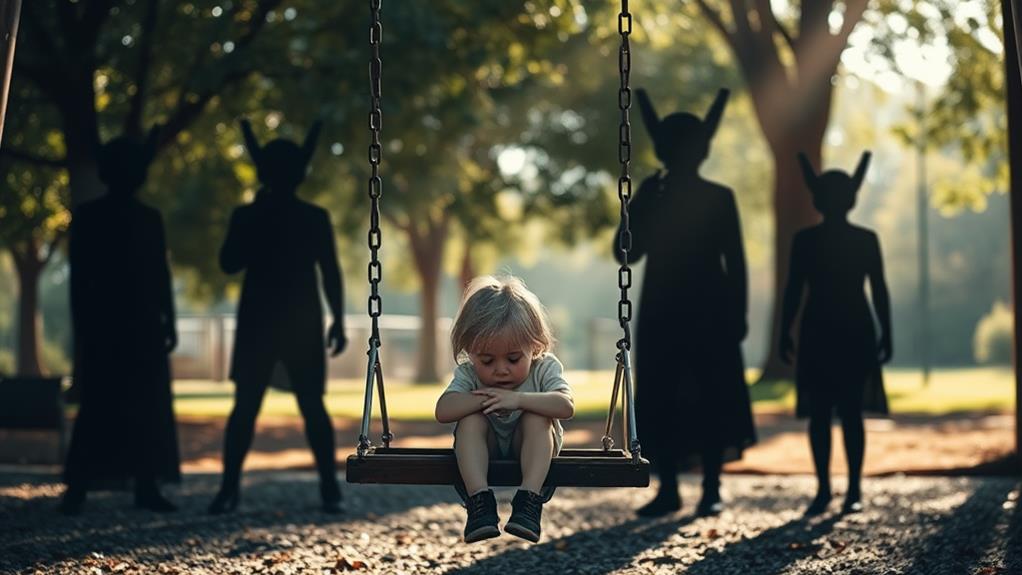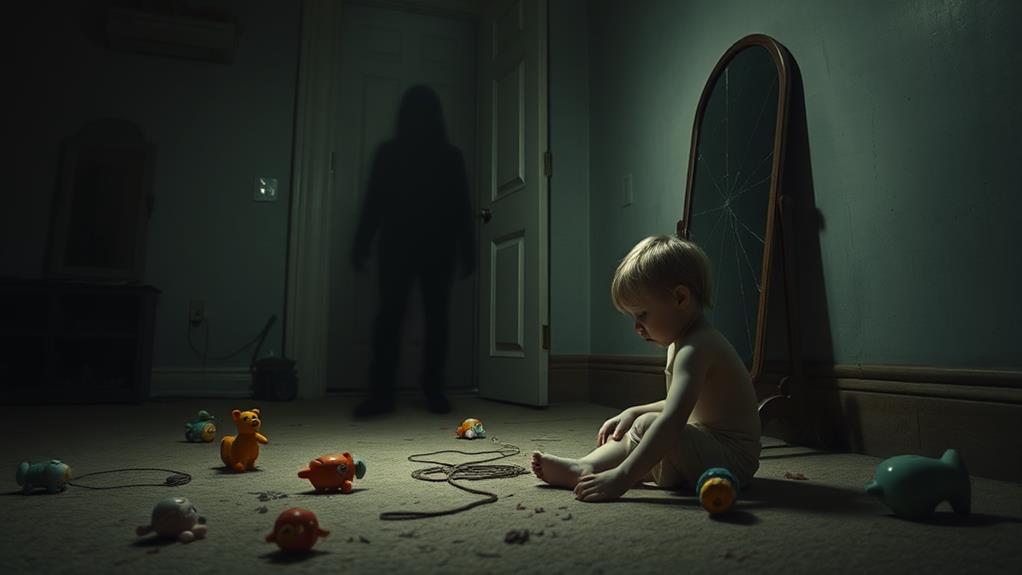When you think about childhood behavioral issues, it's easy to overlook the complexities that come with them. From Oppositional Defiant Disorder to sensory processing challenges, these issues can significantly impact a child's development and interactions. You might wonder how these conditions manifest and the key concerns that arise for parents and educators alike. Understanding these behavioral issues is crucial, especially when it comes to early intervention. So, what are the most pressing concerns that you should be aware of, and how can you effectively address them?
Oppositional Defiant Disorder (ODD)

Many parents find themselves grappling with the challenges of Oppositional Defiant Disorder (ODD), a condition that manifests as a pattern of angry and defiant behavior in children. If your child throws frequent tantrums, argues with you, or refuses to follow simple requests, they might be showing signs of ODD. It's like they've a little rebel inside them, and sometimes that can feel overwhelming!
ODD usually pops up in kids before they turn 8, but it can be diagnosed up until the age of 12. These behavioral problems often shine through more at home or school, where kids feel comfortable being themselves. You might notice they blame others for their mistakes, too. It can be frustrating, but remember, you're not alone in this journey.
Sometimes, ODD can hang out with other disorders, like ADHD, making things a bit trickier. The good news? Early intervention can really help. Talking to healthcare providers about tailored behavioral therapy can make a big difference.
Conduct Disorder (CD)
Conduct Disorder (CD) can feel like a storm brewing in your child's behavior, marked by aggressive actions and serious rule-breaking. You might notice that your child is getting into fights, lying, or even stealing. These disruptive behaviors can be really concerning, and it's important to understand what's happening.
Children with CD often struggle with forming healthy friendships, and their actions can lead to trouble with the law later on.
Now, the good news is that early intervention can make a huge difference! If you spot these behavior problems early, you can work with professionals to create a tailored treatment plan. This often includes behavioral therapy and involving the family, which can help steer your child back on track.
It's important to remember that kids with CD might also have other issues, like ADHD or mood disorders, which can complicate things a bit.
But don't lose hope! With the right support and understanding, your child can learn to manage their behavior and build better relationships. So, stay engaged and keep the lines of communication open—together, you can weather this storm!
Anxiety in Children

Behavioral challenges like those seen in Conduct Disorder can sometimes be related to anxiety in children. Imagine being a kid who feels nervous about school, and suddenly, someone criticizes you. You might react with anger or frustration, even if that's not what you want. This is how anxiety can lead to disruptive behavior.
When children feel anxious, especially in high-pressure situations, they might lash out as a way to escape those feelings. Social anxiety can complicate things, too. Kids who worry about what others think might act out just to hide their discomfort. This can make it tough for them to build friendships or fit in.
It's essential to understand that these behavioral disorders often stem from underlying anxiety in children. If you think your child is struggling, talking to a mental health professional can be a great step. Early recognition and treatment can help prevent those disruptive behaviors from getting worse.
Plus, it can improve your child's emotional regulation, helping them feel better overall. Remember, understanding is the first step to helping them find their calm!
Attention Deficit Hyperactivity Disorder (ADHD)
When a child struggles to focus and frequently acts impulsively, it may be a sign of Attention Deficit Hyperactivity Disorder (ADHD). This condition can really shake things up in your child's life. You might notice that your child has trouble completing tasks, following instructions, or staying focused in school.
These challenges can lead to some behavioral problems that make things tricky, like interrupting conversations or acting without thinking.
It's important to remember that ADHD isn't just about being hyperactive—it's a mix of inattention and impulsivity too. Sometimes, kids with ADHD might also deal with other conditions, like Oppositional Defiant Disorder (ODD), which makes figuring everything out a bit more complex.
But don't worry! There are effective ways to help your child thrive. A combination of behavioral therapy, parent training, and sometimes medication can be a game changer.
With the right support, your child can learn to manage their behavior better and improve their functioning. So, keep your chin up! Understanding ADHD is the first step towards helping your child shine brighter in their own unique way.
Learning Disorders

Learning disorders can create a huge challenge for children, impacting their ability to grasp new concepts and perform in school. If your child struggles with learning, it might lead to frustration that shows up as outbursts during academic tasks.
You might notice they act out when faced with difficult assignments, feeling overwhelmed by the pressure to succeed. Some kids even hide their struggles, fearing they'll be seen as "stupid," which can make things worse.
Understanding the behavior of children and adolescents struggling with learning disorders is key. Identifying these problem behaviors early can help you uncover specific learning challenges.
When you catch these issues early on, it can make a world of difference. Early identification and intervention are crucial for addressing learning disorders, preventing further behavioral problems, and ensuring your child gets the support they need.
Sensory Processing Issues
Children with learning disorders often face additional challenges that can be linked to sensory processing issues. Sensory processing is when the brain has a tough time receiving and responding to information from the senses. This can lead to extreme reactions in busy or overwhelming environments, which might feel like stepping into a circus when all you want is a quiet corner!
Kids with sensory processing problems may have behavioral challenges, like meltdowns or refusing certain clothing or food textures. They might need strict routines to keep their emotions in check, as unexpected changes can throw them off. Imagine feeling like you're on a roller coaster when someone suddenly changes the ride!
When their sensory thresholds are exceeded, children can react aggressively or defensively, making situations tense.
But here's the good news: early identification and intervention can work wonders! With the right support, you can improve their emotional regulation and daily functioning, helping them feel more at ease in their world.
Impact of Trauma

Trauma can cast a long shadow over a child's emotional landscape, making it hard for them to regulate their feelings and develop self-soothing skills. When a child experiences trauma, it can lead to a rollercoaster of emotional ups and downs. They might feel overwhelmed and struggle with behavioral disorders, acting out in ways that seem confusing.
Sometimes, kids misinterpret social cues, thinking someone is being mean when they're just being friendly. This can spark aggressive reactions, as they see threats where there aren't any. It's not just about what happens; it's about how they feel inside.
Feelings of guilt or self-blame can sneak in, causing even more emotional distress. Without positive calming experiences, managing stress becomes a real challenge. This can make behavioral issues even worse.
It's important to remember, though, that healing is possible! With the right support, like coaching in emotional management, children can learn to navigate their feelings more effectively.
Treatment and Management Strategies
Addressing the effects of trauma is just the beginning; effective treatment and management strategies play a pivotal role in helping children overcome behavioral issues. One of the best things you can do is seek early intervention. Catching problems early can really prevent them from turning into bigger issues later on.
Behavioral therapy is often a key part of the treatment plan. It helps modify those pesky disruptive behaviors—especially when parents get involved and learn new skills, too!
Consistency is super important, so using the same rules and positive reinforcement can make a big difference. Think of it like training a puppy; they respond better when they know what to expect!
Ongoing assessments with mental health professionals are essential. They can adjust treatment plans as your child grows and faces new challenges.
Also, don't underestimate the power of a healthy lifestyle. Regular physical activity and good sleep can do wonders in reducing symptoms linked to disruptive behavior disorders.
Prevention and Support Resources

Preventing childhood behavioral issues requires a proactive approach that includes positive parenting practices and access to support resources. You can start by creating a loving and structured environment at home. This means setting clear rules and expectations while also being supportive and understanding.
Quality early childhood care plays a big role, too—it can really help reduce the risk of disruptive behavior disorders.
Public health initiatives focus on prevention strategies, like bullying prevention and mental health support for parents. These resources make a healthier environment for your child, which is essential. Websites like the American Psychological Association and FindTreatment.gov can help you find the right healthcare providers and support networks to manage behavioral concerns.
Engaging in regular physical activity, eating healthy foods, and getting enough sleep can also help keep those pesky behavioral issues at bay.
Don't forget, early intervention through behavioral therapy and parental involvement is key! You've got this, and with a little help from these resources, you can guide your child toward positive behavior and a bright future.
After all, every child deserves a chance to shine!




